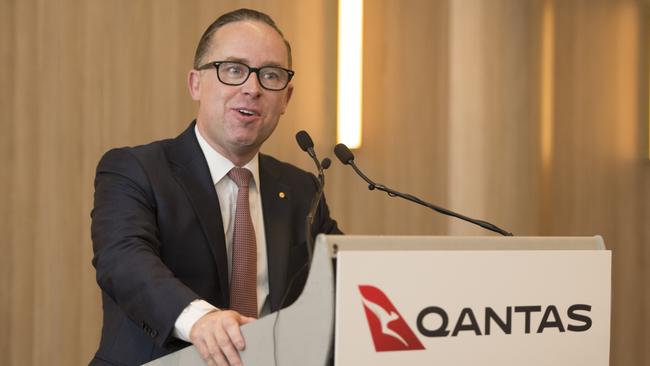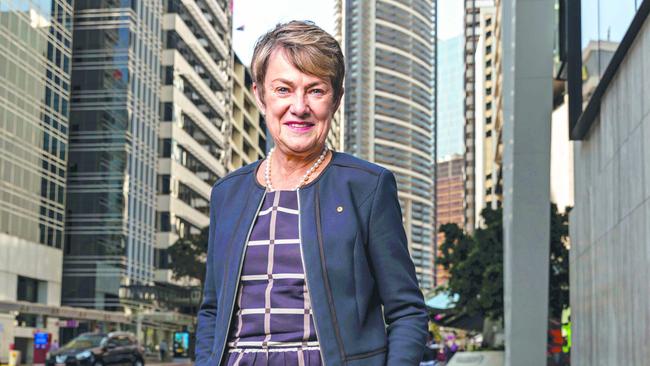Beware the perils of corporate ‘wokeness’
WHEN aspiring board directors are taught there is only one acceptable way to think about contentious social issues, corporate Australia is setting itself up for a fall, writes Miranda Devine.
Rendezview
Don't miss out on the headlines from Rendezview. Followed categories will be added to My News.
THE once staid Australian Institute of Company Directors was founded half a century ago to pursue capitalism’s noble aims of free enterprise and wealth creation which have lifted the world out of poverty and saved billions of lives.
But today it has become a toxic incubator for the cultural Marxism contagion that has spread through corporate Australia.
An informant we shall call Angus, who has completed one of AICD’s overpriced $7699 courses on how to be a company director, complains that he was subjected to relentless propaganda about the virtues of gender quotas on boards, climate activism and other fashionable social causes.
The day on “corporate governance” was particularly hard on anyone with a conservative outlook.

On the second day of the five-day course in a capital city in Australia, the lecturer demanded a show of hands on Qantas’ same-sex marriage activism.
Who could forget CEO Alan Joyce’s notorious comment in 2016 that if people didn’t like a company’s involvement in the marriage campaign, too bad: “you won’t be able to bank and you won’t be able to fly anywhere”.
Back in the classroom of the AICD, Qantas is portrayed as an exemplary corporate citizen.
Only three people in Angus’ group of 30-35 students raised a hand to say they thought Qantas had made a mistake, not because they were against same-sex marriage, but because it could alienate some customers and employees.

It’s a reasonable point, but in the AICD classroom, it was treated as preposterous. Only dissenters were made to explain themselves.
“I was talking about risk mitigation”, says Angus. “But the lecturer said Qantas would have known the way the voting was going to go [and] I was sent to the naughty corner. A lot of people stopped talking to me after that.”
The class also was asked what Rugby Australia should do about star player Israel Folau offending gay activists by expressing Christian beliefs on social media.
“We were told Rugby Australia should be shutting him down or expelling him. He shouldn’t be saying these things …
“If you said you disagreed you were put on the spot and forced to defend your position.
“It wasn’t a dispassionate, independent, unbiased lecture. It was pretty much promoting that this was the right decision for Australia.
“If you’re there doing that course, either your organisation is paying for you or you pay the $8,000 for yourself. [so] there’s a big disincentive to disagree with the lecturer because you have to do an exam and an assignment [to pass]”.
Then there was the suffocating green activism.
“The decisions of banks not to fund Adani’s (Queensland coal project), and decisions by banks to get out of financing of greenfield coal mining were all portrayed as positive because they aligned with Australian community values.”
Gender diversity was another ubiquitous topic across the AICD course, with utopian case studies of companies dominated by female and indigenous board directors.
“Rather than learning business skills you are learning how important diversity is to the success of a business [and how] having more woman on boards is necessary to change the business culture in Australia,” says Angus.
Many of his fellow participants were public servants. More than half were women. Only about ten per cent fell into the category charmingly described by AICD chairman Elizabeth Proust as “male, pale and stale”.
Proust attained her Arts degree in sociology and political science from Melbourne’s LaTrobe University in 1975 and worked as chief of staff to John Cain, the former Labor Premier of Victoria whose calamitous reign makes the Andrews government look sensible. Under Proust, the AICD has become an activist organisation pushing Labor/Greens policies.
It’s probably no wonder that Shadow Treasurer Chris Bowen has promised to give the AICD $3 million of taxpayer money if Labor wins the next election to spend on “Asian-capable” board diversity.
Gender diversity quotas of 30 per cent of women on boards is a particular favourite of Proust, and the AICD board excels with 55 per cent, according to the 2016-17 annual report.
In her view “Business can, be a force for good and it should be an advocate for the kind of society that we want to see.”

Proust also has vigorously opposed the Turnbull government’s corporate tax cuts, breaking ranks with the Business Council of Australia, whose actual role it is to represent business.
Last year she advocated a “move to a fairer tax system … The issue of income inequality was raised several times at this year’s economic summit in Davos in Switzerland,” she said.
The AICD essentially is just a union whose 40,000 members are public servants and other aspiring company directors who stump up $450 a year for the promise of networking with people who might be good for their career and a 30 per cent discount on AICD’s hefty course fees ($10,845 for non-members).
And what a money-making machine it is, with all the $8000 courses booked out until the end of June, annual revenue last year of $72 million (up 10 per cent), and cash assets of $10 million.
Unfortunately, while AICD can still make lots of money while virtue signalling, companies which follow its lead won’t fare so well.
Proust insists that diversity is crucial to corporate success. There is no peer-reviewed evidence base for her claim.
But even if she is right, what’s the point of diversity in the superficial qualities of skin colour, gender and sexuality, if you exclude ideological diversity from corporate Australia?
If the views of conservatives are rejected as illegitimate by the very AICD course which trains directors for company boards, while leftist views go unexamined, you are just breeding smug, self-righteous hubris, and creating an intellectual environment where error is inevitable.
Thus, we see the evidence at the banks royal commission, with a parade of shamed financial services companies, whose dedication to “diversity and inclusion” was second to none.



